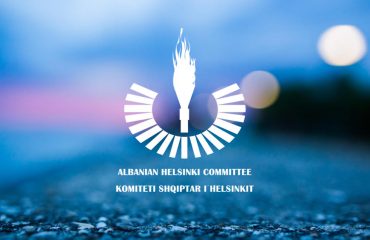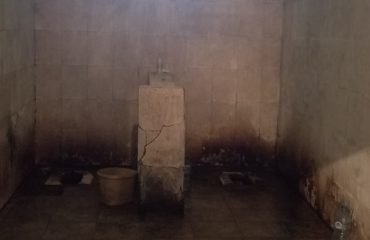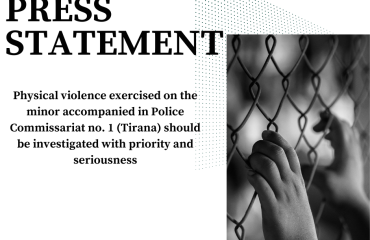The Albanian Helsinki Committee (AHC) partially monitored the electoral process on the voting day and continues to monitor the vote counting process for the parliamentary elections of June 25, 2017. A total of 160 observers accredited by the CEC conducted the monitoring, which extended over 11 ZEACs and 154 voting centers in 9 districts of the country, precisely in Tirana, Durrës, Elbasan, Shkodra, Kukës, Korça, Vlora, Fier and Gjirokastra. The majority of the observers are lawyers, trained in advance on the legal aspects and the methodology of the observation. Furthermore, we collaborated with observers of the Albanian Disability Rights Foundation to monitor respect for the right to vote of this category of citizens.
The overall environment on voting day and during the partial process of the vote count monitoring was generally calm. Isolated incidents were reported in the media involving different citizens and competent bodies are investigating them. We consider that the source of these incidents lies mainly in the hate speech used particularly by party leaders, in the tendency and persistence that this or that political force should come out first.
Media reported some instances of the phenomenon of vote buying and selling. AHC notes that compared to previous elections, it is positive that there was an increase in the number of cases denounced by the media and citizens, which enables a full and effective investigation by the prosecutor’s office. We consider that the prevention of and fight against this phenomenon requires the engagement of all political forces, which instead of mutual accusations should undertake the necessary measures in order to prevent any vote buying/selling by their party militants.
During the electoral silence days, there were cases when representatives of electoral subjects made political statements or committed actions of a propagandistic nature, thus violating the Electoral Code. The Media Monitoring Board also reported the violation of electoral silence.
AHC encountered rare cases of materials of a propagandistic nature being within the distance prohibited by law, which were not removed by the VCCC during the conduct of preliminary actions, or we noticed that there were voting centers that were too close (20-30 m) to the two electoral offices of an electoral subject, etc. In the district of Vlora, ZEA 84, VC 4492, voting was interrupted because outside the center, but very close to it, there were individuals carrying out electoral propaganda. In VCs 1724/1, 1724/2, 1726 and 1726/1 of ZEA 32 in Tirana, we encountered in the corridors of the centers persons who influenced voters. Following the intervention of the VCC, the persons departed.
AHC expresses appreciation overall for the positive work of the Central Election Commission as the highest electoral administration body, which engaged intensively and committedly to resolving some important problems. Nevertheless, in the cases of violation of electoral silence or in cases when obstacles to accredited observers conducting full monitoring were reported, the CEC should have been more proactive and should have made public its stances and measures undertaken in accordance with the Electoral Code.
AHC found with concern the delayed proposals and the last-minute replacement of a number of second and third-level commissioners (ZEACs, VCCs, VCGs). Taking into consideration the nature of violations reported by our observers during the monitoring, it is our opinion that these irregularities are partially due to the hasty and poor training of members of these bodies, because the proposals mentioned above arrived very late from the electoral subjects entitled to do so. This phenomenon also took place in previous elections, but the peculiarity in these elections was that it was more marked and visible. These delays and replacements led, in some cases, to blocking of the voting process without legal reasons, as was the case in some voting centers in the city of Kavaja.
The presence of unauthorized persons inside some voting centers as well as in some sites where these centers were located, including their yards, was in violation of CEC decision of June 24, 2017, and was the cause of the partial blocking of the voting process. Based on information from observers, the VCCs were passive in seeking to put order inside the VC premises, which created the impression that the monitored VCCs were not aware of the above decision of the CEC. Unauthorized persons who did not carry evident identification signs asked voters whom they were going to vote for or after they were done voting, and instructed them on the basis of some lists to head toward their VCs
We found that in over 25% of the VCs, voting did not start at 7:00. The causes varied and included delays in VCC members’ showing up, completion of actions for opening the voting center due to the lack of knowledge of the legal procedure, the replacement of a few VCC members in the last minute, etc. AHC observers encountered a series of violations and shortcomings in the conduct of preliminary actions for the opening of VCs, in the completion of documentation for VCC work, in respecting procedures envisaged by the Electoral Code for voting by voters, as well as for assistance to persons with disabilities. We encountered sporadic cases of voters being allowed to vote without a document with biometric data or was allowed to vote with a certificate, in violation of the Electoral Code. For all these violations, observers presented written remarks to the VCC, which in some cases were accepted and protocoled.
Transparency of the electoral administration bodies at the local level toward accredited observers was not complete. AHC observers in some cases were obstructed to carry out their duties to monitor without obstacles in all phases of the voting process (opening, during the process and the closing). In few cases, the observer was threatened that he would be expelled from the voting center if he were to present other written remarks. Apparently, some monitored VCCs, not only did not know the rights and duties of the observers (article 7 of the Electoral Code) but also did not appreciate their monitoring role.
The principle of the secrecy of voting was violated in sporadic cases by voters themselves but there were even cases when VCC members themselves violated this principle. We encountered one isolated instance in ZEA 82 of the Vlora District, whereby the voter photographed the ballot but the VCC did not consider the ballot damaged. Regarding this issue, it is notable that in spite of recent changes to the Criminal Code, photographing of the vote is criminally punishable, according to the Electoral Code, in such cases, the voter is given another ballot. It is our opinion that this defect should be reviewed in the provisions of this Code.
Cases of the prohibition of the exercise of the right to vote were rare. In Voting Center no. 1919/1, ZEA 37, Tirana District, there were voters who did not find their name on the voter list and were forced to search in several voting centers as to where they should be voting. In other cases, voters were not able to vote due to mismatches between the family name in the identification document and the name in the voter list.
AHC encountered some cases of voting by persons with disabilities who received help from family members or voters of the same voting center. In the majority of encountered cases, the legal procedure envisaged in the Electoral Code was not respected. In one case published in the media, at the “Hasan Prishtina” school in Tirana, a disabled voter was not allowed to vote by the VCC chairwoman on the grounds that the Electoral Code does not envisage this, at a time when the Electoral Code does entitle them to this opportunity. Furthermore, according to preliminary data, it appears that the necessary measures envisaged by the law were not taken in order for persons with disabilities to be given the necessary opportunity and facilitation to exercise their right to vote.
Although cases of family voting in the monitored VCs were rare, it is our opinion that this does represent a disturbing problem as it has to do with the principle of vote secrecy. In their written remarks, our observers contributed in some cases to the prevention of this violation.
In general, the closing of the voting process was realized at 20:00, following the extension of the deadline by the CEC. However, based on information from our monitors, it results that part of the VCs were closed before that time. In spite of the good intention, the extension of the closing time of VCs by the CEC at a late hour, caused lack of clarity, lack of information and some confusion. Overall, we found that procedures for closing voting centers were respected, with the exception of a case when VCC members were not familiar with the procedure for closing due to the lack of training.
Overall, to the extent we had an opportunity to observe the vote counting procedures, which we are still monitoring, we noticed that members tasked with the vote count and proposed very late by political parties, from a legal aspect were not prepared at the required level. It resulted that ballot boxes and electoral materials arrived on time, except for ZEAC no. 2, District of Shkodra, ZEAC no. 35, District of Tirana, ZEAC no. 24, District of Durrës, ZEAC no. 58, District of Fier. In ZEAC no. 2, District of Shkodra, electoral materials from remote areas arrived around 4.30. Until the early morning hours, it results that counting had not begun at ZEAC no. 24, District of Durrës, because the electoral subjects had not proposed the names of VCG members. Counting at ZEAC no. 35, District of Tirana, began at 07:05 of today. Until 07:30, in ZEACs no. 47, 48, 49 and 50, of the District of Elbasan, the counting had not begun.
In general, procedures for the vote count were respected and there were no contestations among VCG members and ZEACs. In ZEAC no. 41, District of Tirana, it was reported that the ballots were passed on the monitor very fast, but after observers’ remarks, the ZEAC ordered the slowing down of actions by the VCG. The same problem was encountered also in ZEAC no. 84, District of Vlora.






